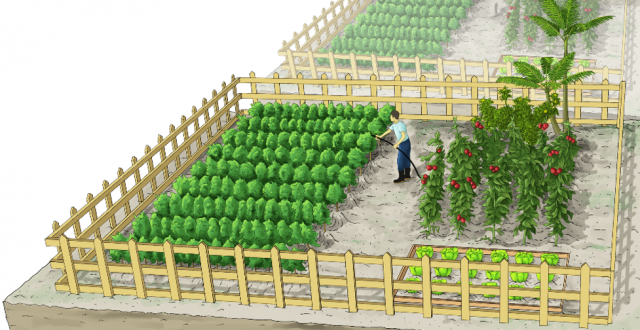Media Center
Addressing Food Security Through Urban Farming
August 12, 2020 : 2:04 pm

Introduction
Fishing and subsistence agriculture have played a vital role as main sources of food security and livelihoods in the islands of Maldives, vastly helping the local communities for decades. Despite the decline in importance of the sector to the GDP few years ago, Agriculture production in Maldives has been increasing in recent years. Some islands have developed specialized production of certain crops, such as Kandoodhoo for their bonnet chillis, Thoddoo for their watermelons, and Fuahmulah for their taros. To this day, locally grown produce lives up to their reputations and have always been valued higher over imported products among Maldivian locals.

Urban farming- A lifeline for food security
Urban farming is production of food and food items beyond home consumption and using the produce to create an income through individual families or community groups. This includes innovative food-production methods that can maximize production in small areas. In the past, our culture was structured to use home grown crops for food security. There has been a time when people extend their produce for a larger scale with the neighbors to share the produce within the neighborhood group or end up in a fair trade as an income generating method. Thus, it is important to provide such opportunities in developing cities in order to revive the lost culture and heritage due to limited space and increased population.
Hulhumalé as a pioneer in Urban Farming
With the congestion in Malé, Hulhumalé was reclaimed to address the existing and future housing, commercial and industrial needs of the Malé region. The city was planned with a number of green and open spaces included in its development to provide a better quality of environment to its residents. In order to address the issues of congestion, economic instability and environmental degradation of urban life in Hulhumalé, Housing Development Corporation (HDC) plans to involve the community in renovation of their neighborhoods through the community gardening program. As the population of Hulhumalé is comprised of people who migrated from elsewhere, HDC also hopes to strengthen the social connections within the community through this program.
However, with the COVID-19 pandemic, the project has been re-envisioned to include and prioritize the component of food production and supply within the community and empower vulnerable groups within the society. The re-envisioned and prioritized objectives of the urban farming project undertaken by HDC also aligns with numerous strategies of the Government’s Strategic Action Plan (SAP), falling under Blue Economy for Small and Medium Enterprises and Agriculture sectors. Specifically, the strategies and actions related to development of Agri-centres, standardizing food production and quality of produce, establishing urban gardening models, strengthening agricultural data collection mechanisms and increasing the efficiency of resource allocation through capacity building. Furthermore, the project also supports incorporation of entrepreneurship education into TVET programmes and integration of technological support for start-ups through business incubator platforms. The establishment of the project will strengthen the resilience of the economy by linking the developments to local needs and opportunities. This project is part of governments efforts to strengthen food security, local production and also to improve human and technical capacity in order to mitigate the impacts of Covid-19.
The project was initially planned to be developed as a leisure park. However due to the interests shown by Hulhumale’ residence in community gardening, HDC took the opportunity to develop this allocated land as an urban farming project planned with equally divided allotments that would be awarded to local residents within the city to grow fresh food while participating in sustainable urban practices, building community connections through shared activities as well as enjoying the harvest together. In addition to the 600sqft farming lots, HDC also plans to include a tool-shed with mini storage spaces, a seed incubator shed, a public toilet block and a fertilizer shop accompanied by hangouts spots within the project premises.
 Site map of the urban farming project
Site map of the urban farming project
Through this urban farming project; it would create equal opportunities to public with additional benefits. 48 farmers will be selected from a range of demographics to allow maximum opportunities for the community. 40% of applicants selected will be women and 30% of applicants selected will be from groups with both one youth member and one PWD (persons with disabilities) member at the least. The remaining slots (30%) will be open for general applicants. An onsite training would be provided by Ministry of Fisheries, Marine Resources and Agriculture based on the crop chosen by the individual farmers.
Current status of the Urban Farming project
Physical construction of Urban farming project was commenced on 13th July 2020 by a public announcement declared on the project site. The mentioned announcement was released to allow Hulhumale’ residence to remove the existing plants and other materials which were not given any prior approval. A 07 days’ notice was given before clearing the site on 13th July 2020 and fencing has been started on the project site as construction works are ongoing at the site. A duration of 06 months is allocated for this project before handing the gardening space to selected farmers. Awareness sessions regarding the program and official announcement to apply for this program would be shared by HDC as physical construction works proceeds.




